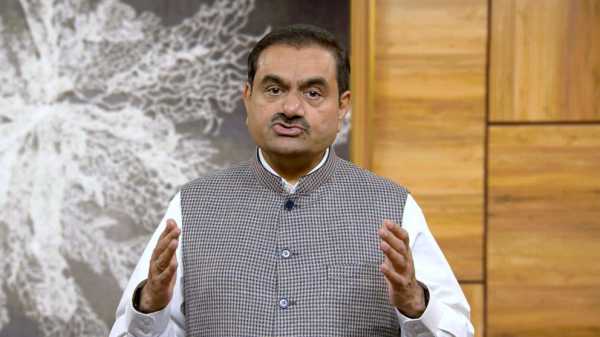
NEW DELHI — Shares in troubled Adani Enterprises gyrated Friday, tumbling 30% and then rebounding after more than a week of heavy losses that have cost it tens of billions of dollars in market value.
The company, the flagship of India’s second-largest conglomerate, canceled a share offering meant to raise $2.5 billion earlier this week after U.S. short-selling firm Hindenburg Research issued a report accusing it of market manipulation and other fraudulent practices. Adani denies the allegations.
Opposition lawmakers blocked Parliament proceedings for a second day Friday, chanting slogans and demanding a probe into the business dealings of coal tycoon Gautam Adani, who is said to enjoy close ties with Prime Minister Narendra Modi.
"We have no connection″ with the Adani controversy, Parliamentary Affairs Minister Pralhad Joshi told reporters outside Parliament on Friday.
In an interview with CNN News 18, Finance Minister Nirmala Sitharaman brushed off concerns that the losses would spook global investors and said India's financial market was “very well regulated.”
“As a result, the investors' confidence which existed before shall continue even now,” she said, adding that the controversy wasn't “indicative of how well Indian financial markets are governed.”
At least one prominent international investor, French oil giant TotalEnergies, defended its investments in Adani. TotalEnergies said Friday it has limited exposure to the current problems and has not re-evaluated its stakes in Adani businesses.
The French company said it had carried out due diligence when it making $3.1 billion in investments in Adani, and that the entities TotalEnergies invested in “are managed in accordance with applicable regulations.”
Amit Malviya, the governing Bharatiya Janata Party’s information and technology chief, said in a television interview that the opposition was using Adani’s crisis to target the Modi government over a private company's shares and their market movements. “Regulators are looking into” what happened, he said.
The market watchdog, the Securities and Exchange Board of India, has not commented. The Economic Times newspaper reported, citing unnamed SEBI sources, that it had asked stock exchanges to check for any unusual activity in Adani stocks.
Shares in Adani Enterprises fell as much as 30%, to 1,017 rupees ($12), on Friday. At the end of trading, the price had recovered to 1,531 rupees ($18.70) but was still down by 2%. The company's share price has plunged more than 50% since Hindenburg released its report last week, when it stood at 3,436 rupees ($41). Stock in six other Adani-listed companies was down 5% to 10% on Friday.
So far there has been no indication that the company’s woes might threaten the wider financial sector in India. Its equities market is large enough to sustain the fallout at this moment, said Brian Freitas, a New Zealand-based analyst with Periscope Analytics who has researched the Adani Group.
“Adani stock forms a small part of the equities market and investor concerns right now are restricted to the company, not the whole system or market itself,” Freitas said. India's Nifty and Sensex indexes were both higher on Friday.
It could take time for problems to surface, Shilan Shah of Capital Economics said in a report. “From the macro perspective there are few signs of contagion," he said. “But it is too early to sound the all clear."
The S&P Dow Jones indices said Thursday it would remove Adani Enterprises from its sustainability indices beginning Tuesday, following a “media and stakeholder analysis triggered by allegations of stock manipulation and accounting fraud.”
That might dent the Adani Group's sustainability credentials and could affect investor sentiment, Freitas said.
Credit rating agency Fitch said there was no immediate impact on credit ratings for the Adani companies.
Gautam Adani, who made a vast fortune mining coal and trading before expanding into construction, power generation, manufacturing and media, was Asia's richest man and the world's third wealthiest before the troubles began with Hindenburg's report.
By Friday, his net worth had halved to $61 billion, according to Bloomberg’s Billionaire Index, where he dropped to the 21st spot worldwide.
He has said little publicly since the troubles began, though in a video address after Adani Enterprises canceled its already fully subscribed share offering he promised to repay investors. The company has said it is reviewing its fundraising plans.
Hindenburg's report said it was betting against seven publicly listed Adani companies, judging them to have an “85% downside, purely on a fundamental basis owing to sky-high valuations.” Other issues in the report included concerns over debt, alleged use of offshore shell companies to artificially raise share prices and past investigations into fraud.
Adani's speedy, debt-led expansion in recent years caused his net worth to shoot up nearly 2,000%. Even before last week, critics said his ascent was aided by his apparent close ties to Modi and his government. Analysts say he has been successful at aligning his priorities with those of the government by investing in key sectors, but point out that he also has major infrastructure projects in states that are ruled by opposition parties.
“The question now turns to the future of the Adani Group and how they will grow,” said Aveek Mitra, founder of Avekset Financial Advisory.
As a company heavily involved in infrastructure — from airports and ports to highways — it needs financing to grow in order to service its debt, which stands at $30 billion, out of which $9 billion is from Indian banks.
Adani may be able to sell some assets and continue its expansion, but at a much slower pace than earlier, Mitra said.
“Banks, financial institutions and investors will think five times before investing now,” he added.
___
Associated Press writers Ashok Sharma in New Delhi and Angela Charlton in Paris contributed to this report.
Sourse: abcnews.go.com






